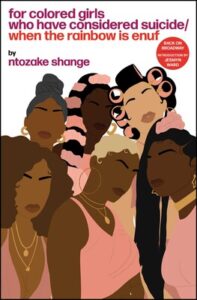
Jesymn Ward on Discovering for colored girls who have considered suicide/when the rainbow is enuf
“I am so thankful to Ntozake Shange for seeing us, reflecting us.”
I found Ntozake Shange’s for colored girls who have considered suicide/when the rainbow is enuf when I needed it. My need was amorphous, inarticulate; I was a voracious reader as a teenager. In my free hours, at lunch and study hall, I wandered my small high school library’s stacks, and I picked up book after book, inhaling a title a day.
Part of me read for the pleasure of reading, of sinking into another reality. I wanted to float down rivers on riverboats in cholera-stricken lands with lovers. I wanted to resist totalitarian regimes, scratch “nolite te bastardes carborundorum” in closets. But part of me gulped books ravenously because I was starved: I wanted to see myself in what I read, and I did not. There were some writers, like Margaret Atwood or Gabriel García Márquez, who wrote characters who would inspire a recognition, a taste of familiarity, but the flavor would fade.
I was also beginning my descent into depression during my teenage years, feeling alienated, feeling low, feeling gaslit by the entire world, a world that witnessed my hard work in school and out, but told me that if I ever made it into a good college, it would not be because of my aforementioned work; it would instead be because of “preferential treatment,” affirmative action, even as my family and I lived our lives close to the bone: running out of gas with my father and pushing the car to the closest payphone; eating from big, plastic blocks of government cheese and mixing powdered milk for cereal; watching my parents work hard at multiple, low-paying jobs so we could barely scrape by.
But part of me gulped books ravenously because I was starved: I wanted to see myself in what I read, and I did not.
I discovered for colored girls who have considered suicide/when the rainbow is enuf on a high school field trip. I was at a local college for an academic competition. After I bombed the math portion, my teacher took us to the bookstore. I wandered the aisles, glancing at the array of offerings when an illustration of a woman arrested my attention. She was brown, wore a yellow scarf and earrings that I would have sported if I could; there was something vulnerable about her face, a tremulous darkness about her eyes. Pain papered over with false calm. She looked as if she had considered suicide, was considering it now, even as she looked out at the world beyond the book, where those blind to her beauty wandered past her. She looked like me. I had just enough money to buy the book, and I read it on the bus ride back to my high school campus.
It was a revelation: the language was poetic, rich with vivid simile and metaphor. The women’s diction was familiar in rhythm, and it ran down the pages like a song. I could hear the echo of my grandmother’s voice, my mother’s voice, my aunts’ voices in it. When “lady in orange” says: “hold yr head like it was ruby sapphire / i’m a poet / who writes in english / come to share the worlds witchu,” I heard myself. It was as if my secret identity that I yearned to embrace, the aspirational writer, surfaced in the spaces between the type and told my teenage self this: Hello: I see you.
I am so thankful to Ntozake Shange for seeing us, reflecting us. I am grateful to her for weaving our words into drama, into poetry, and showing us how beautiful we can be, for loving us colored girls who considered suicide, and for showing us the rainbow is enuf.
_____________________________
Tickets for the Broadway revival of for colored girls who have considered suicide/when the rainbow is enuf, directed and choreographed by Tony Nominee Camille A. Brown, are available now.
Ntozake Shange (1948–2018) was a renowned playwright, poet, theater director, and novelist. Her body of work includes Obie Award–winning for colored girls who have considered suicide/when the rainbow is enuf, Some Sing Some Cry with Ifa Bayeza, and the posthumous Dance We Do: A Poet Explores Black Dance and I Am an Old Woman. Among her numerous accolades are the Langston Hughes Medal for Literature, a Guggenheim Foundation Fellowship, the Pushcart Prize, the Poetry Society of America’s 2018 Shelley Memorial Award and three AUDELCO awards. Ms. Shange’s work has been nominated for a Grammy, a Tony, and an Emmy.

Excerpted from for colored girls who have considered suicide/when the rainbow is enuf by Ntozake Shange. Excerpted with the permission of Scribner, a Division of Simon & Schuster, Inc. Copyright © 1997 by Ntozake Shange.
Jesmyn Ward
Jesmyn Ward is the author of Sing, Unburied, Sing, winner of the 2017 National Book Award for Fiction, and Salvage the Bones, winner of the 2011 National Book Award for Fiction. She is a professor of English at Tulane University, where she holds the Andrew W. Mellon Professorship in the Humanities.



















